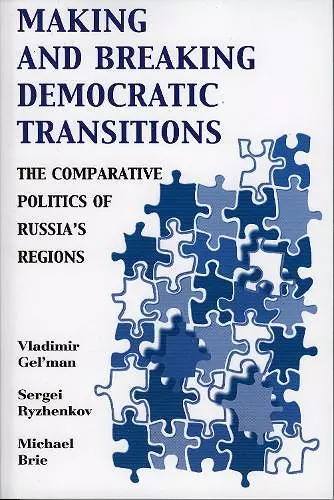Making and Breaking Democratic Transitions
The Comparative Politics of Russia's Regions
Vladimir Gel'man author Sergei Ryzhenkov author Michael Brie author Vladimir Avdonin author Boris Ovchinnikov author
Format:Paperback
Publisher:Rowman & Littlefield
Published:12th Jan '05
Currently unavailable, and unfortunately no date known when it will be back

Focusing on the vastly different outcomes of post-Soviet regime transitions, this study explores why some societies have become more democratic and some have not. Based on in-depth comparative analyses, the book assesses political developments in six of Russia's regions (Saratov, Nizhnii Novgorod, Volgograd, Ryazan', Ul'yanovsk, and Tver' oblasts) since 1988. The authors consider the influence of Soviet governance systems on the emergence of cleavages and new actors in the post-Soviet period. They also analyze the impact of institutional changes on regional regimes and the success or failure of formal institutions as a framework for political competitiveness. Placing their detailed field data within the larger comparative and theoretical context of political transitions, the authors are able to explain the mixed outcomes of post-communist regime change in Russia and other post-Soviet nations. With its innovative model of path-contingent democratization and its new typology of political regimes and regime transitions, this book will be essential reading for all scholars of democracy.
This is a profoundly important contribution to the field of Russian studies likely to influence how we conceive political change in Russia for many years to come. * The Russian Review *
[Gel'man's] summaries of transitology and Russian political science will be useful to specialists both in Russia and the west, and this is a powerful statement of the need for systematic comparison. * Slavic Review *
Making and Breaking Democratic Transitions marks a major contribution to the literature on comparative politics from the younger generation of Russian political scientists. An authoritative analysis of developments in Russia?s regions is placed within a refreshingly intelligent new model of regime change. Not only is this a pathbreaking book in the study of post-Communist regimes, and of Russia in particular, but it will interest anyone thinking and writing about transitions?of all kinds.... -- Mary McAuley, author of Russia's Politics of Uncertainty
Making and Breaking Democratic Transitions is required reading for anyone interested in understanding Russia's protracted transition from communist rule. Most importantly, the book deploys the comparative method to discuss the often-neglected regional dimensions of transition. The regional focus makes important insights about transitions in large states that contributes to our more general understanding of democratization beyond the Russian case. It is a serious book by a superb collection of authors that mixes interesting theory and original empirical research. -- Michael McFaul, Stanford University
Vladimir Gel’man and his colleagues add enormous depth to our picture of Russia’s troubled transition by systematically comparing dynamics and results across the regions of the country. This study tells us all more, not only about the Russian experience, but about regime change in the contemporary world. -- Timothy J. Colton, Harvard University
Making and Breaking Democratic Transitions marks a major contribution to the literature on comparative politics from the younger generation of Russian political scientists. An authoritative analysis of developments in Russia’s regions is placed within a refreshingly intelligent new model of regime change. Not only is this a pathbreaking book in the study of post-Communist regimes, and of Russia in particular, but it will interest anyone thinking and writing about transitions—of all kinds. -- Mary McAuley, author of Russia's Politics of Uncertainty
Gel'man tweaks the existing theories to bring them into better line with Russian reality and provides a useful framework for telling the story of political change during the last 15 years. The case studies are the most coherent histories of the regions that have come along yet. -- Robert Orttung, American University
Provides a broadly-structured assessment of the politics of regional regime transformation. -- Derek S. Hutcheson * Europe-Asia Studies *
An essential text that aids our understanding both of politics in Russia and the nature of political transitions in general. * Slavonic & East European Review *
Advanced undergraduates, postgraduates and academics will find this to be an essential text that aids our understanding both of politics in Russia and the nature of political transitions in general. * Karl Cordell, University Of Plymoth *
This volume illustrates how the collapse of Soviet communism has unevenly affected the political and social dynamics of six Russian Oblasts (Saratov, Nizhnii Novgorod; Volgograd, Ryazan', Ul'yanovsk, and Tver') and more importantly, how the elite class of each region has managed to deal with (or take advantage of) unique structural conditions and variants of a Soviet legacy. This book effectively mixes normative assertions with concrete examples to reveal just how complicated the world of post-authoritarian politics is. Gel'man Ryzhenkov and Brie's normatively driven analysis of the Russian transition has wider application as it raises important questions about the hueristic value of the transition paradigm. -- Neil A. Cruickshank, University of Saint Andrews * Political Studies Review *
ISBN: 9780742525610
Dimensions: 228mm x 153mm x 25mm
Weight: 467g
320 pages